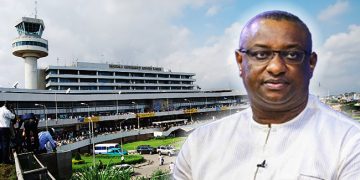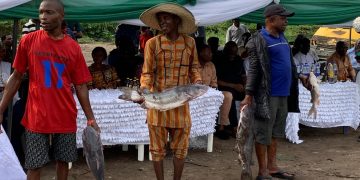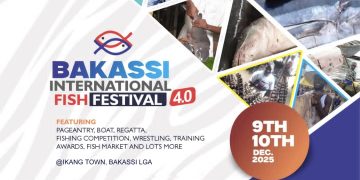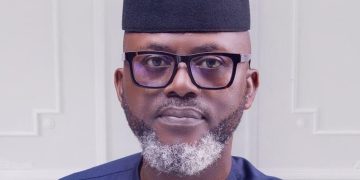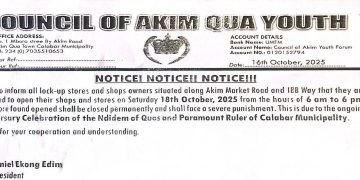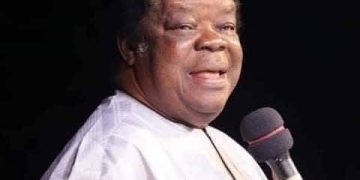Minister of Aviation and Aerospace Development, Festus Keyamo (SAN), says the Federal Government will come hard on people who obtain licenses to operate private flights but clandestinely commenced commercial flights. He also discusses airline maintenance, repair and overhaul, and other issues affecting Nigeria’s aviation industry.
The senior advocate was a guest on Channels Television’s Newsnight programme during the week.
Someone will say it’s amazing how a lawyer and a Senior Advocate of Nigeria will be sitting in an aviation chair and piloting the industry in this nation. How has it been like for you?
(It’s) an exciting experience for me. I just have to give kudos to Mr President for his vision, his dexterity. I don’t know how he knew that about 90% of what we have to do in aviation has to do with the interpretation of BASAs (Bilateral Air Service Agreements), enforcement of agreements, and all of that, so it’s incredible.
So, it’s like he threw you into your area?
He (the President) threw me into a natural environment. For me, it also requires a lot of diplomatic shuttles, and funny enough, I am a fellow of international arbitration for the United Kingdom so I discovered that most of this work has to do with interpretation of international agreements and all of that. So I just found myself in a natural environment and I’m loving it.
How are you loving the fact that it’s under your watch that Air Peace is now flying direct to the UK?
I discovered that immediately I resumed office my natural skill as a lawyer and member of the inner bar is needed to interpret these BASAs and enforce them. So, I put my feet on the ground for these things to happen for our local operators. It has drawn a lot of accolades but now I can tell you that it is barely scratching the surface because we have quite a lot of issues to deal with in the aviation sector. This is just a low-hanging fruit that we decided to pluck. There are a lot of things that we need to address in the aviation sector but the support for our local operators is one objective we identified very early in this administration. I did not see any previous government highlight this issue, this objective as much as this government is doing now. Support for local operators and their survival is key to revamping the economy and giving customer satisfaction in terms of pricing. 90% of those we preside over in the aviation industry are local operators. They are private sector people. So, if we don’t pay attention to them, what am I presiding over as aviation minister? One of the marching orders Mr President gave me is to pay attention to our local operators and make sure their businesses survive through government policies and programmes.
So, when we came on board, we identified five priority areas in the aviation sector, the first one, of course, is safety because safety is number one in the aviation sector. Secondly, we talked about the improvement of infrastructure across the country and that is one area we are going to address, but it’s not a quick fix; it’s not a low-hanging fruit as it were, but we are going to address it. It is the improvement of our infrastructure that enhances customer experience. We talk of terminal buildings, the arrival and departure halls, and all of those things. We are going to address all of that but there are also other infrastructure that people do not see every day that also improve the aviation sector. The MROs — the Maintenance, Repair and Overhaul facilities. We want to attract MROs to the country. In fact, we have set that as one of our major priorities. People are looking at local airlines now crashing airfares and not putting pressure on the naira, but the MRO is just going to be the final nail in the coffin. When we bring in the MROs, our planes will not have to go out again for C Checks and this will reduce the cost of operations as they don’t have to source for foreign currency again to pay their international obligations because everything in the aviation industry now is in dollars. When you want to change a bolt, you want to do one check or the other, you have to source for foreign currency and it’s putting pressure on the naira but when we bring these facilities into Nigeria, that will serve the whole of West Africa, Central Africa and part of North Africa, you will see that they will chase the naira. Those in Africa will have to look for the naira to come and use these facilities and you will see how much it will improve the naira. [MOU1]
He (the President) threw me into a natural environment. For me, it also requires a lot of diplomatic shuttles, and funny enough, I am a fellow of international arbitration for the United Kingdom so I discovered that most of this work has to do with interpretation of international agreements and all of that. So I just found myself in a natural environment and I’m loving it.
How are you loving the fact that it’s under your watch that Air Peace is now flying direct to the UK?
I discovered that immediately I resumed office my natural skill as a lawyer and member of the inner bar is needed to interpret these BASAs and enforce them. So, I put my feet on the ground for these things to happen for our local operators. It has drawn a lot of accolades but now I can tell you that it is barely scratching the surface because we have quite a lot of issues to deal with in the aviation sector. This is just a low-hanging fruit that we decided to pluck. There are a lot of things that we need to address in the aviation sector but the support for our local operators is one objective we identified very early in this administration. I did not see any previous government highlight this issue, this objective as much as this government is doing now. Support for local operators and their survival is key to revamping the economy and giving customer satisfaction in terms of pricing. 90% of those we preside over in the aviation industry are local operators. They are private sector people. So, if we don’t pay attention to them, what am I presiding over as aviation minister? One of the marching orders Mr President gave me is to pay attention to our local operators and make sure their businesses survive through government policies and programmes.
So, when we came on board, we identified five priority areas in the aviation sector, the first one, of course, is safety because safety is number one in the aviation sector. Secondly, we talked about the improvement of infrastructure across the country and that is one area we are going to address, but it’s not a quick fix; it’s not a low-hanging fruit as it were, but we are going to address it. It is the improvement of our infrastructure that enhances customer experience. We talk of terminal buildings, the arrival and departure halls, and all of those things. We are going to address all of that but there are also other infrastructure that people do not see every day that also improve the aviation sector. The MROs — the Maintenance, Repair and Overhaul facilities. We want to attract MROs to the country. In fact, we have set that as one of our major priorities. People are looking at local airlines now crashing airfares and not putting pressure on the naira, but the MRO is just going to be the final nail in the coffin. When we bring in the MROs, our planes will not have to go out again for C Checks and this will reduce the cost of operations as they don’t have to source for foreign currency again to pay their international obligations because everything in the aviation industry now is in dollars. When you want to change a bolt, you want to do one check or the other, you have to source for foreign currency and it’s putting pressure on the naira but when we bring these facilities into Nigeria, that will serve the whole of West Africa, Central Africa and part of North Africa, you will see that they will chase the naira. Those in Africa will have to look for the naira to come and use these facilities and you will see how much it will improve the naira. [MOU1]
We also want to improve our Instrument Landing System (ILS). In the aviation sector, any equipment above 10 years should be due for upgrade because there’s so much dynamism in the aviation sector. So, we are in the process of improving the ILS equipment in the five international airports and all the airports. We are also looking at those equipment that guide planes to land even in the haziest conditions.
The third objective now is to support our local operators, ensure their survival and prosperity while at the same time holding them to the best international standards. There’s a high level of mortality rate in the aviation sector. In the last 40, 50 years, more than 100 airlines have gone down in Nigeria, and we ask ourselves; why are they going down? What is happening with the attendant loss of jobs? I’m going to come back to Air Peace but I’m just listing our five objectives. So, we discovered that support for local operators is key.
The fourth one is human capacity development and we thought that we need to train and retrain our aviation personnel. There’s something I discovered in the industry that I’m going to come very hard on. Some people are bypassing critical training when they ought to go for refresher training at regular intervals and all of that. Some of them are skipping it, but I’m going to ensure that this thing does not happen because it will impact the safety in the industry.
The final objective is revenue generation. We are a revenue-generating ministry with all the agencies almost revenue-generating. We want to optimise that, ensure that we digitalise the process of human factor collecting fees. We want to optimise revenue for the Federal Government. These are the five priority areas we looked at and we think we are on cause to realise them.
You’ve talked about your five-point agenda but let’s go back to the support for local airlines and the matter of revenue generation. Different fees are being paid by local operators. Is that going to reduce in any way because that’s part of what the airline operators complain about. They say they are not making any money because there’s so much of taxation here.
Well, we met that on the ground, and I’ve ordered a review of those taxes. Now to ensure that Nigerians have succour at the end of the day, I called the NCAA (the Nigerian Civil Aviation Authority) that is in charge of all of that and I’ve told them to look at it again. There are some charges that are very important, no doubt about that. All over the world you have charges built on tickets that you can’t avoid but there are some that we can avoid in order not to put pressure on the traveling public. I’ve directed the NCAA to look at it again and come up with recommendations as to which ones can be adjusted or tweaked for the benefits of Nigerians.
Has it been that easy for you?
Well, there are very difficult issues and issues that may take some time for us to deal with. It’s not a quick fix, but we can start somewhere. We have started already, we have identified the ones we want to attract people to come and cooperate with us to achieve. We have identified the ones we want to concession. Even the MROs I mentioned earlier, international investors are talking to us. We are a place of choice because they just realise that Nigeria is a huge market, West Africa is a huge market, Central Africa a huge market and Nigeria as the Big Brother in these regions. They just realise that Nigeria is a place to establish these MROs so that it can attract customers from all over Africa. The Arabs are talking to us, the Chinese are talking to us, the Americans are talking to us, the Europeans are talking to us. They’re coming with their money. Many of them are coming with all kinds of very juicy packages for us saying they can build and operate them. We have the traffic, we have the economy, we have the people, we have the ambition, so we can do it.
This sounds very ambitious especially considering the fact that in our space we also have competing issues. For instance, you’re talking about MROs, there are states who are also building MROs. Akwa Ibom, for instance, has built that though it’s not yet operational.
The more the merrier. We are supporting the building of the MRO in Akwa Ibom, in Uyo. I went there, fantastic facility that is there, I mean Akwa Ibom has just shown the world that a subnational can do so much like the private sector and they have spent so much of their energy on this over the years. Akwa Ibom has been very lucky to have successive insightful governors who are very focused. The present governor has continued in that trajectory. I went there, and I saw what they are doing. They are even building a proper hub for sub-regional operations. It’s beautiful and like I said, the more the merrier. We’re not going to depend on one facility, one facility cannot take all the airplanes in West Africa, Central Africa or part of North Africa, it cannot. We are aiming to have at least one MRO in all our five major international airports. We can take two in some, but at least one in Enugu, one in Kaduna, in Kano one, in Abuja, one in Port Harcourt, and one in Lagos.
It is one of the major reasons affecting the operations and the survival of local airlines because each time they have to fix their planes, they spend so much forex for normal routine checks like C checks or D checks. Some of them cannot even raise the forex, so the airline dies. So, these are all the plans we have to ensure their survival.
The other plan is to ensure that they have access to aircraft that other airlines around the world also have access too. And the only way for an airline to survive on a long term is not to survive on wet or damp leases. It is to have access to dry leases; dry leases are far cheaper, the terms are better and almost all the airlines in the world survive on dry leases. When you get these planes on very good terms and then you have to hire your own crew, your own pilots and captain and everybody, everything will be local, you don’t have to import the crew because when you do, you have to take care of them in foreign currency and all of that.
One other thing that is hampering that (dry leases) is the insurance policy. This is the first time I’m going to talk about it, but it’s a major issue that we are looking at. The lessors around the world insist that you don’t place the risk in the local market in Nigeria. They don’t want the risk of the insurance to be placed in the local market, they insist that the risk should be placed in international market. However, we have a problem in Nigeria where the National Insurance Commission (NAICOM) insists that all of this risk must go through our local insurance. I support local content, however, the problem is that the risk in aviation is so big that most of this local insurance will have to go for reinsurance again for them to survive it. They have to go for reinsurance in the international market once the risk is placed in local market and this is at extra cost to our local operators. International lessors and manufacturers are insisting that they will not bring aircraft here if the risk is placed in the local market. They are saying: ‘Place the risk in the international market before we can bring our aircraft’. These are the twin issues I’m attacking. I want to start engaging the National Insurance Commission to look at an exception for dry leases. Other insurance within the sector can come to the local operators because I support local content but, on this issue, the international lessors are not going to bend, they want the risk to be placed in international market and not in the local market. We’ll be engaging NAICOM in the next few months.
I was in France to assure them, all the lessors in Europe, almost all them gathered in Airbus to wait for me and Airbus being one of the manufacturers who give these planes to them, asked me if we are ready for them because they cannot ignore us. We’re going to work together to clear all those knotty issues.
How about human capital development by the airlines for quality service delivery?
Training and retraining will happen among our airlines because there will be competition. What drives customer satisfaction? It’s competition. What brings about good prices is not monopoly. Nobody will fly an airline with poor service delivery if there are 15 other options. But for a foreign country to dominate our airspace, dominate our airlines, dominate our total routes here? We’re not going to allow that to happen.
You’ve said service delivery aids competition and customer satisfaction but you’ve also said that some people are skipping training.
These are things we cannot discuss before the camera because there are people within the system, bad eggs who just take gratification and endorse these (untrained) people to continue, not knowing that you are putting the flying public in danger. I have my intelligence report on this and I’m going to do something about it very soon. You are going to hear some kind of announcement I’ll make in the next one or two weeks on this issue including unlicensed private aircraft in commercial operations. These private jets, almost all of them, are operating commercial to the huge loss of revenue to the Federal Government. They get licences for private operations but do five to eight commercial flights a day. It’s economic sabotage and I’m not going to allow that to happen. Some people who are even my friends or friends of Mr President, we are going to come hard on all of them and perhaps ground all their planes, withdraw their licenses. We’re not going to allow that to happen. To the issue of training and retraining, it is in most of these private aircraft you see those who have not gone for their routine training and we have complicit people within the system, people who are supposed to check them that are not doing their job. I have intelligence on them and we coming very hard on them because we have to raise revenue for the federal government, ensure that the laws are kept and that Nigerians are safe.
Read original article on ChannelsTV
